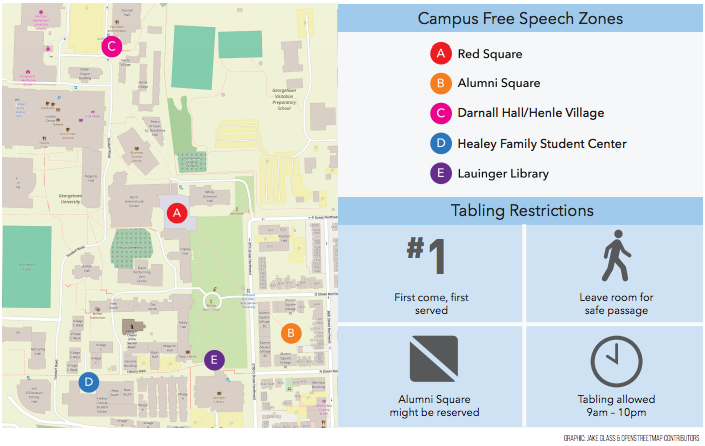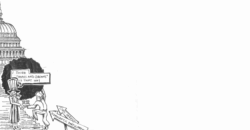Georgetown was one of the ten worst schools in the nation for free speech in 2014.
That is according to a report released in 2015 by FIRE (the Foundation for Individual Rights in Education) which gave the university a red light rating, the worst of three ratings a college can receive.
Georgetown’s speech and expression policy is available on its website. The university “is committed to standards promoting speech and expression that foster the maximum exchange of ideas and opinions,” it states.
Sandy Ungar, a former president of Goucher College and a professor who teaches a seminar on free speech at Georgetown, defended the free speech environment at the university. “FIRE hands out a lot of red light ratings; Georgetown is hardly in a small, exclusive club,” he said. “I see H*yas for Choice behind a table in Red Square with great frequency, so I think that they manage to get their message across pretty effectively.”
For some, however, that is not enough.
In September, the Voice reported that a Georgetown University Police Department officer removed a condom envelope from the door of a H*yas for Choice representative. H*yas for Choice Co-President Brinna Ludwig (NHS ’17) said that the incident was a result of confusion and that she did not fault the officer. However, she does fault the system.
“I think that there isn’t sufficient training in the free speech policy, necessarily,” she said. “I think that goes for students, administration, staff, and faculty.”
Georgetown Chief of Police Jay Gruber clarified the incident involving the GUPD officer who tore down the envelope. He explained that the officers involved were called to the floor because of suspected vandalism. Among other things, two doors were tied together with fishing line and other doors had fishing lines strung together with a condom and bread hanging off of it.
“There was an envelope with a large penis drawn on it and some other verbiage, so the officers thought that this was some sort of vandalism and so they took everything down,” Gruber said. “They certainly weren’t targeting a condom envelope on a door. It certainly wasn’t an officer walking by, seeing an obscene image, and taking it down on their own.”
D.J. Angelini (MSB ’17), GUSA’s free speech policy chair, explained that he believes that these types of events are not the norm. “I think it’s often misunderstood, I think that GUPD as a whole has a very good understanding of the free speech and expression policy,” he said. “The problem comes when it’s individual actors … it’s oftentimes one individual person who may not understand the policy, and then that person becomes a representation of the institution.”
Chief Gruber said that he sent a reminder email to all of GUPD after meeting with H*yas for Choice about the fact that students’ doors are free speech zones. “Every new officer is trained on the speech and expression policy,” he said. “In 2015, every member of the department was retrained on the [policy] by the Center for Student Engagement staff.”
However, there is some ambiguity in the policy as to how much authority GUPD has in determining what is obscene. “It’s really not clear in the policy if GUPD has the authority to determine what is and is not explicit. In this case, it was a very well-drawn, anatomically correct penis,” Ludwig said.
Students have the ability to pursue a hearing with the Free Speech and Expression Committee if they believe that their speech rights have been violated. In this particular instance, Ludwig said, the students chose not to, but she also mentioned that condom envelopes are often torn down.
As a private Jesuit institution, Georgetown has had to find a balance between upholding traditional Jesuit values and promoting student freedom of speech and expression. In an effort to find that balance, the administration has designated free speech zones around campus for free expression, the most prominent of which is located in Red Square. As an unrecognized group, H*yas for Choice can only table in designated free speech zones.
These limitations on the speech of unrecognized student groups play a role in the university’s red light rating. A university must have a clear restriction that infringes on what is or what should be protected expression to receive a red light rating, according to FIRE’s website. A yellow light rating indicates that a school has policies that “could be too easily used to restrict protected expression,” and a green light rating signifies that a school has no policies that seriously imperil free speech.
Azhar Majeed, FIRE’s Director of Policy Reform, explained that the organization’s mission is to defend student and faculty rights at universities across the country.
When asked why Georgetown’s rating was so poor, Majeed explained that Georgetown’s speech codes and applied practices show disregard for student speech rights. “Over the years, we have attempted to intervene on behalf of a student group called H*yas for Choice,” he said. “Georgetown has repeatedly infringed on their right to distribute materials on campus and to go about their daily affairs and conducted daily activity.” Majeed pointed to a specific event in September 2014 when H*yas for Choice was tabling on the sidewalk outside the front gates. The people tabling were removed by GUPD for no clear reason, and then were allowed to return after an hour. Chief Gruber later apologized for the incident.
“What FIRE has said is that the University can’t have it both ways,” Majeed continued. “It can’t claim to be an institution for free speech and liberal inquiry, but at the same time claim that it can restrict any speech that it does not wish to take place on its campus.”
Georgetown is not alone in its red light rating. Majeed said that of over 400 schools across the country, FIRE has only given 28 green light ratings.
Freedom of expression plays a central role in free speech at Georgetown, but other factors cannot be ignored, such as which student groups the university chooses to recognize. Fraternities and sororities are unrecognized by the university because they are perceived to represent values antithetical to the university’s. Due to this status, these and other unrecognized groups, such as H*yas for Choice, must work without having access to the benefits that other organizations have, such as getting funding from the university.
An email was sent out for the second year in a row earlier this semester by the Division of Student Affairs that the leadership of fraternities and the GUSA free speech team perceived to be dissuading students from joining fraternities or sororities. This served as a catalyst for the creation of a GUSA liaison to Greek life this year.
Tucker Cowden (MSB ’17), the first and current GUSA liaison to Greek Life, spoke to how the free speech policy affects those organizations, and how GUSA works to help these organizations recruit and also reserve rooms. “The role that the free speech team in GUSA has is that during things like CAB Fair where there’s tabling on the lawns, there’s an assigned space for non-access-to-benefits-groups,” he explained.
As an organization, H*yas for Choice is limited to designated free speech zones. “At the beginning of all of our meetings, we have to designate that what we’re saying is not sanctioned by the university,” Ludwig said. “A lot of other student groups who are recognized by the university have a lot more freedom.”

Doors to residential rooms and apartments are considered free speech zones, with the policy stating, “students may use this space to post flyers or materials intended to express perCampus Free Speech Zones sonal views.” RA’s doors are not included because the doors are considered university property, but other students’ doors have traditionally been a protected free speech space. H*yas for Choice representatives commonly put condom envelopes on their doors, as allowed by their individual free speech rights under Georgetown’s policy.
Ungar addressed the conflict between the university’s Jesuit values and promoting the free speech of students and student groups who may not fall in line with Jesuit teachings, like H*yas for Choice. “Georgetown is a Jesuit and Catholic university, and it has certain values that are well-known and well-advertised so nobody should be surprised when they get to Georgetown,” he said. “But I actually think that Georgetown manages to create a pretty impressive, delicate balance between its Jesuit philosophy and its free speech values.” To Ungar, it is most important that students are able to speak freely and get their message heard.
“My experience is that they do.”





